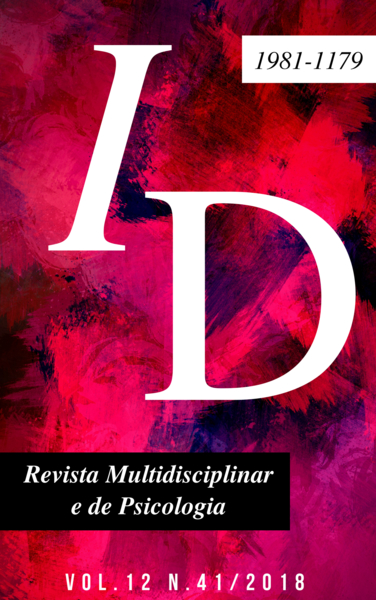A Ciência explica a Felicidade?
DOI:
https://doi.org/10.14295/idonline.v12i41.1280Palavras-chave:
Felicidade, saúde mental, bem-estar subjetivoResumo
A felicidade caracteriza-se por uma disposição emocional positiva, acompanhada de sentimentos de prazer e bem-estar, em geral associados à uma coerente compreensão do mundo ou do contexto de uma determinada situação. É um fenômeno eminentemente subjetivo, vinculado a traços de personalidade e a dimensões socioculturais. Favorecer situações que levem os indivíduos a reconhecerem as emoções em si e nos outros, bem como uma promoção de políticas públicas de promoção à saúde mental e emocional, podem ser benéficas como ações de prevenção nas áreas social e ocupacional.
Downloads
Referências
BONANNO, G. A. Loss, trauma and human resilience. American Psychologist, 59(1), 20-28, 2004.
CLONINGER, C.R. - Feeling good: the science of well-being. Oxford University Press, New York, 2004.
CLONINGER, C.R. - The science of well-being: an integrated approach to mental health and its disorders. World Psychiatry 5: 71-76, 2006.
CSIKSZENTMIHALYI, M. Flow: The psychology of optimal experience. New York: Harper & Row, 1990.
DICIONÁRIO ON LINE DE PORTUGUÊS. Disponível em: < https://www.dicio.com.br/>. Acesso em 12.07.2018.
DIENER, E. Subjective well-being. Psychological Bulletin, 95(3), 542-575, 1984.
ELLIOT, J. A., MCGREGOR, H. A., e GABLE, S. Achievement goals, study trategies, and exam performance: A mediational analysis. Journal of Educational Psychology, 1999, 91 (3), 549-563.
EKMAN, P. - Are there basic emotions? Psychol Ver, 1992, 99: 550-553.
FORGAS, Joseph. P. Affective intelligence: The role of affect in social thinking and behaviour. Em: J. Ciarrochi, J. P. Forgas, & J. D. Mayer (Eds.) Emotional intelligence and everyday life (pp.46-63). New York: Psychology Press, 2001.
SELIGMAN, M.E.P.; CSIKSZENTMIHALYI, M. - Positive psychology: an introduction. Am Psychol 55(1): 5-14, 2000.
STEGER, M. F., MANN, J. R., MICHELS, P., & COOPER, T. C. Meaning in life. In S. J. Lopez (Ed.), Handbook of positive psychology (2nd ed., pp. 679-689). Oxford, UK: Oxford University Press, 2009.
STEGER, M. F. Meaning in life. In S. J. Lopez (Ed.), Oxford handbook of positive psychology (2nd ed., pp. 679-687). Oxford: Oxford University Press, 2009.
PETERSON, C. e SELIGMAN, M. Character strengths and virtues: A handbook and classification. Washington, DC: American Psychological Association, 2004.
Downloads
Publicado
Edição
Seção
Licença
Os autores detêm os direitos autorais sem restrições, devendo informar a publicação inicial nesta revista, em caso de nova publicação de algum trabalho.









